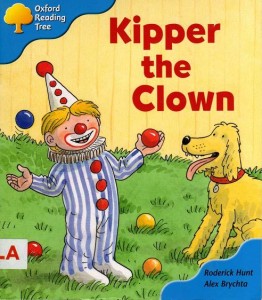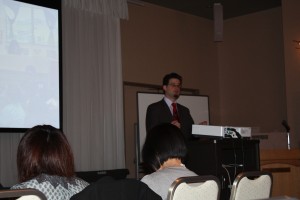business conference curriculum EFL eikaiwa ES expectations extensive listening extensive reading kids language courses Language learning listening online resources presentations Reading school management self-study teaching technology theory university vocabulary
by sendaiben
8 comments
Amazing Minds 2011
I’m on the train on the way back to Sendai now, after a long, tiring, and wonderful weekend talking and learning about teaching. Pearson Kirihara was kind enough to invite me to their annual study meet, Amazing Minds, held in Tokyo this year.
The basic idea behind the event is that the publisher’s sales representatives nominate teachers all over Japan who are then contacted to see if they want to attend. Pearson picks up the tab for travel, accommodation, and food, and puts on a two-day program of presentations, discussions, and informal gatherings. Apparently it’s supposed to be a chance for the company to give back to the teaching community, to join and contribute to the dialogue on teaching in Japan, and to get to know individual teachers better.
I was initially skeptical, although having two of my friends (John Wiltshier and Ann Mayeda) presenting made it a lot easier for me to say yes and make the effort to clear my schedule.
The program for the event was three blocks: one on Saturday followed by dinner, then two on Sunday. Each block consisted of an initial one-hour lecture followed by a ninety-minute group activity session, and finally a feedback session to finish off. Each block was three and a half hours, a long time when you are out of practice concentrating. I got a good sense of what my university students go through most days (they have up to five ninety minute lectures per day).
The three lectures were:
“Two Pathways for Successful Language Learning”, John Wiltshier
“Teaching in 2020: Rethinking the Classroom Environment”, Ann Mayeda
“Lesson Analysis Checklist for Elementary School English Education”, Emiko Yukawa
I have to say I really enjoyed the presentations and came away with dozens of actionable ideas. Overall it was a great experience. I did notice a few things that could be tweaked to make it even better, but I have already passed those on to the organizers and don’t need to mention them here. Instead, I’d like to talk about the highlights.
Probably the biggest realization came during the first lecture, as John was talking about procedural and declarative memory, as well as the optimal period for language acquisition. It came to me quite suddenly that perhaps I am not a normal language learner. After all, I learned my first second language when I was five, in a total immersion environment. I have been at least intermediate in six languages, and find it fairly easy to pick up new ones mainly through input and trial and error. Very few people have this kind of background.
The problem is that I have made all sorts of assumptions about teaching and learning that are based on the possibly mistaken belief that my own experiences are generalizable -that I can teach my students as I would like to be taught and this will provide them with an optimal learning environment. If I am an outlier, however, this is unlikely to be ideal for my students. There will possibly be more effective ways of helping them learn and I will have to go back and examine literally everything I do once again with an open mind.
This seems fairly obvious when I write it here, but it seriously had not really occurred to me before.
Fortuitously, my beliefs about language learning are mainly a bias towards large amounts of input of the appropriate level, a desire to encourage my students to become self-directed and independent learners, and a tendency to believe that learners need to practice in order to improve (ie listen if they want to get better at listening, talk if they want to talk, and so on). I don’t think any of these are harmful.
The second, perhaps less revolutionary, but more specific breakthrough came from Ann’s presentation on flipping the classroom. Much like the Khan Academy, she is interested in ways teachers and learners can lever technology in order to do more outside the classroom, in turn allowing them to use their limited class time on more efficient or productive activities.
It’s a concept I have been very interested for a long time, as it ties in with my own beliefs about the best ways to learn a language.
Independent, self-directed learning is the only way students can possibly get the necessary amount of input and practice they will need to master English. The amount of time is several orders of magnitude larger than even the most specialized or intensive language course could provide. Using the power of the internet to facilitate this means that it is easier than ever for students to come into contact with foreign languages.
The only specifically new things for me in the presentation were several iPad/iPhone apps, but the real value came from the way I was reminded of various extremely promising ideas that I had meant to implement, but that had somehow ended up on the back burner.
Creating a Youtube channel for my students, pre-teaching things online so that students to go over them as many times as they need to in order to master them, introducing online resources in a more systematic way, monitoring and advising students as they explore various self-study options.
Hopefully I’ll be able to get started on one or more of these in the near future. I will definitely keep you posted.
Finally, Yukawa-sensei’s presentation gave me a good look at a systematic way of assessing classes and lesson plans. Again, there was nothing new in this presentation, but it was a great opportunity to once again go back and think about things in a slightly different light.
I used to do a lot of classroom observation when I was the ALT Advisor at the Miyagi Board of Education, and although I didn’t have anything as elegant as Yukawa-sensei’s checklist, I was looking at similar things.
I’ll be applying to checklist to my own classes this week, and predict that I will find several areas to work on during the next few months.
I really enjoyed the weekend and hope Pearson continues putting on these events for teachers and that they consider having me back again sometime.
conference curriculum EFL eikaiwa expectations kids Language learning Oxford Reading Tree presentations readers Reading teaching theory Uncategorized
by sendaiben
2 comments
Oxford Teaching Workshop in Niigata (March 12th)
I’ll be presenting again as part of the Oxford Teaching Workshop 2011. It’ll be taking place in Niigata, at the Coop City Hanazono, on Saturday March 12th.
The lineup is as follows:
| Saturday, March 12, 2011 | |
| 10:00-10:30 | Registration |
| 10:30-11:20 | Reading in Class: Opening the Door to an English World Ben Shearon |
| 11:40-12:30 | Teaching Ideas to Add Variety and Spice to your Lessons Ritsuko Nakata |
| 12:30-13:30 | Lunch |
| 13:30-14:20 | What you need to know for Shogakko Eigo Katsudo! Setsuko Toyama |
| 15:00 | Doors Close |
I’ll be talking mainly about using the Oxford Reading Tree and other story books in class. Hope to see some of you there!
conference online resources presentations technology
by sendaiben
leave a comment
The Best Clicky Thing
This is the best clicky thing (computer remote control for powerpoint presentations) I have seen so far. I have one, I love it, and I saw three other people using them at the ER Seminar on Sunday.
If you’re looking for a clicky thing, or you’re a presenter and you don’t have one yet, you could do much worse than buying it online from Amazon (that is an affiliate link, if you don’t want to use it just search for Logicool R-800 on Amazon or online).
conference curriculum EFL expectations JALT language courses Language learning presentations readers Reading teaching theory university
by sendaiben
leave a comment
Extensive Reading Seminar 2011
I just got back from the 2011 ER Seminar, held in Okayama this year.
Had a good time, attended some useful presentations, and saw a bunch of great people. The best conference I have been to in a long time. Especially enjoyed the plenaries and Nakano sensei’s presentation. Got some actionable ideas to adopt(steal) for my classes.
Okayama also seemed like a nice place during the very limited time I was there 🙂
Miles Grogan was kind enough to shoot my presentation for me with my iPhone, so I have finally managed to upload one of my presentations to Youtube:
The quality is not great, but you get the idea. Here are the slides:
conference curriculum EFL eikaiwa ES kids Language learning Oxford Reading Tree presentations Reading school management
by sendaiben
leave a comment
Oxford Teaching Workshop and ER Seminar in Okayama
This morning went very well, thanks to everyone who came along! You can find the powerpoint file in .pdf format below, and I should have the video up once I get it back from the kind folks at OUP.
Next stop is the ER Seminar in Okayama next Sunday, where I’ll be presenting about how to expand an extensive reading program beyond a single class. Hope to see you there!
PDF file below:
Reading in Class Open the Door


